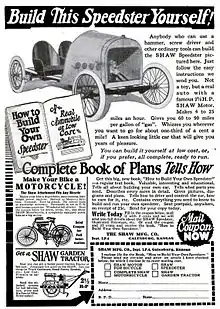Shawmobile
The Shawmobile was a small two-seat buckboard-type vehicle from the horseless carriage era powered by a front-mounted gasoline engine with belt drive to the rear wheels. Wheels are of the wire bicycle type.
History
In the nineteenth century, Stanley Shaw first invented his own steam engine. At the dawn of the motoring age Stanley Shaw invented his own gas engine. By 1903 the "Shaw Manufacturing Co." of Galesburg, Kansas advertised an engine kit for motorizing a bicycle in Popular Mechanics magazine for $90. The engine was 241 cc with dry cell battery ignition and a slip belt drive. Advertised cruising speed was 20 mph (32 km/h), with a maximum speed of 30 mph (48 km/h). By 1905 Shaw was mass-producing his engines to convert bicycles to motorcycles.
To further increase sales, Shaw began selling plans to build a car to use his engine. It was a very primitive car, a buckboard with a motor, but a real car. By 1906 he was manufacturing complete motorcycles. By 1908 Shaw built and sold complete Shawmobiles. Ads claim 25 mph (40 km/h) with the original Shaw engine. Spindly, spidery, the Shawmobile helped put America on wheels far cheaper than a Ford of the day. Shaw redesigned the car in 1922 to look more conventional.

The redesigned "Shaw Speedster" looks very like the later King Midget series one, which was also advertised as a "real car." The redesigned Shaw car was produced until 1930. In 1915 Shaw also redesigned the engine kit featuring an improved H-20 engine with a magneto ignition, and chain drive.
Buckboard type cars were also built during the same period by Buckeye in Cleveland, Ohio (only made in 1901), and by Waltham as the Orient Flyer from about 1903. The Orient Flyer was rear engined with friction drive. A similar buckboard design was also used by the A.O. Smith Company starting in 1915. Similarly to Shaw, A.O. Smith also motorized bicycles with a device call the Smith Motor Wheel. To increase sales of its bicycle engine the Smith company developed and sold a small buckboard car call the Smith Flyer which was propelled by the motor wheel. Later still, in May 1919, A.O. Smith sold the Motor Wheel rights to the Briggs & Stratton Corporation of Milwaukee, Wisconsin. Briggs & Stratton sold the buckboard car as the Briggs & Stratton Flyer.
Briggs & Stratton produced the Motor Wheel and Flyers until 1925. Briggs & Stratton then sold the Flyer to Automotive Electric Services (AES) Corp. of North Bergen, New Jersey.
AES continued to manufacture the Flyer under the name Auto Red Bug. AES continued to sell Flyers with Briggs Motor Wheels until the supply of those motors was exhausted. AES then switched the Red Bug to electric power and continued to manufacture them until some time in 1928. Inspection of a 1923 model however does show a data plate on the vehicle that states it was manufactured by Automotive Standards, Inc. in North Bergen, New Jersey.
Also a [Rutgers University] library item lists an advertisement for "Red bug: the electric roadster" as manufactured in Newark, N.J. by Automotive Standards, Inc., [s.a.].
In the 1950s Banner Welder Inc. of Milwaukee, Wisconsin sold a similar buckboard car version as the Banner Boy Buckboard. American Buckboard Corporation, Los Angeles, California, USA also sold a similar car in 1955-1956. It was also a revival of the 5-wheel Briggs & Stratton Flyer. It was sold as the American Buckboard and as the Bearcat. The latest production version found was made by McDonough Power Equipment from the 1940s through the 1960s which was sold as their Model 60.
See also
- List of microcars by country of origin: U
- Smith Flyer
- Briggs & Stratton Flyer
- List of defunct United States automobile manufacturers
Sources
- Farm Collector - Celebrating Shaw Manufacturing
- Gas Engine Magazine - Shaw Manufacturing Co. History
- GALESBURG: LAND of SHAW’S Mfg. Co. by Robert J. Varsolona
- Waltham Museum reference
- The Chanute Tribune
- Galesburg Museum
- old publications by Shaw Manufacturing Co
- Popular Mechanics magazine
- G.N. Georgano (Editor) (1982). Complete Encyclopedia of Motorcars. London: Ebury Press. ISBN 0-85223-234-9
References
- David Burgess Wise, The New Illustrated Encyclopedia of Automobiles
- Altman, Jim, “The Motor Wheel”, Antique Automobile, March–April 1971, 19-24.
- McFarlan, Donald, Editor, The Guinness Book of Records, Bantam Books, 1992, page 361.
- Ken W. Purdy, Motorcars of the Golden Past, Galahad Books, NY, Pages 98–99.
- Rodengen, Jeff, The Legend of Briggs & Stratton, Write Stuff Syndicate, 1995, pages 30–39.